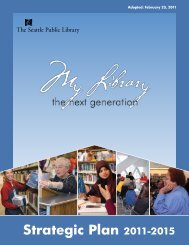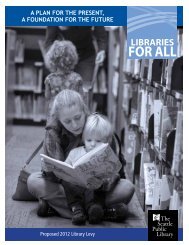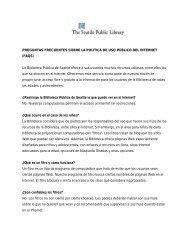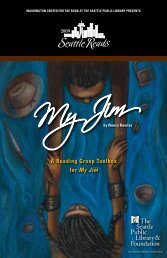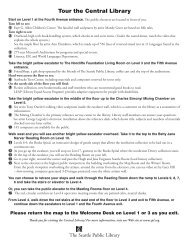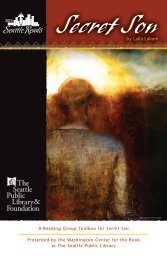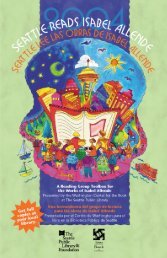Download - Seattle Public Library
Download - Seattle Public Library
Download - Seattle Public Library
You also want an ePaper? Increase the reach of your titles
YUMPU automatically turns print PDFs into web optimized ePapers that Google loves.
Leading the discussion<br />
Research the author using resources such as Current Biography, Contemporary<br />
Authors, and Something About the Author. Find book reviews in Book Review Digest and<br />
Book Review Index. The Dictionary of Literary Biography gives biographical and critical<br />
material. These resources are probably available at your local library. Reviews of the<br />
book, interviews with and biographical information about the author, and questions<br />
for discussion can also be found online.<br />
1. Come prepared with 10 to 15 open-ended questions. Questions that can be<br />
answered “yes” or “no” tend to cut off discussion quickly.<br />
2. Alternatively, ask each member of the group to come with one discussion<br />
question. Readers will focus on different aspects of the book, and everyone will<br />
gain new insights as a result.<br />
3. Questions should be used to guide the discussion and keep it on track, but be<br />
ready to let the discussion flow naturally. Often you’ll find that the questions you<br />
have prepared will come up naturally as part of the discussion.<br />
4. Remind participants that there are not necessarily any right answers to the<br />
questions posed.<br />
5. Don’t be afraid to criticize a book, but try to get beyond the “I just didn’t like it”<br />
statement. What was it about the book that made it unappealing? The style? The<br />
pacing? The characters? Has the author written other books that you liked better?<br />
Did it remind you of another book that you liked or disliked? Some of the best<br />
book discussions center on books that many group members disliked.<br />
6. Try to keep a balance in the discussion between personal revelations and reactions<br />
and a response to the book itself. Of course, every reader responds to a book in<br />
ways that are intimately tied to his or her background, upbringing, experiences,<br />
and view of the world. A book about a senseless murder will naturally strike a<br />
chord in a reader whose friend was killed. That’s interesting, but what’s more<br />
interesting is how the author chose to present the murder, or the author’s attitude<br />
toward the murderer and victim. It’s often too easy to let a group drown in<br />
reminiscences. If that’s what the whole group wants to do, that’s fine, but keep in<br />
mind that then it’s not a book discussion.<br />
Sample questions for your discussion<br />
1. How does the title relate to the book?<br />
2. How believable are the characters? Which characters do you identify with?<br />
3. What themes – motherhood, self-discovery, wilderness, etc. – recur throughout<br />
the book? How does the author use these themes?<br />
4. Why do certain characters act the way they act? What motivates a character to do<br />
something that she would not normally do? Is there anything that you would call<br />
“out of character”?<br />
5. What types of symbolism are in this novel? What do these objects really<br />
represent?<br />
6. Think about the broader social issues that this book is trying to address. For<br />
example, what does the author think about anarchy versus capitalism as a<br />
means of life? How is a particular culture or subculture portrayed? Favorably?<br />
Unfavorably?<br />
7. Where could the story go from here? What is the future of these characters’ lives?<br />
8. How is the book structured? Flashbacks? From one or multiple points of view?<br />
Why do you think the author chose to write the book this way?<br />
9. How does this book relate to other books you have read? Would this book make<br />
a good movie? If there is a film adaptation of this book, what is brought out or<br />
played down in the film version?<br />
10. What did the author attempt to do in the book? Was it successful?<br />
11. How believable were the plot and subplots? What loose ends, if any, did the<br />
author leave?<br />
12. What is the great strength – or most noticeable weakness – of the book?<br />
22 23




